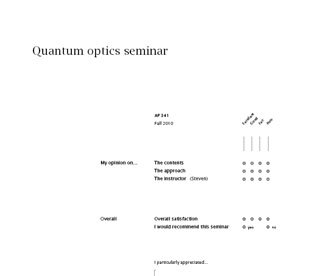You can evaluate your sessions in two ways: objectively, by checking whether you have achieved the learning outcomes with your students; and subjectively, by asking the students for feedback.
Formally, you can check whether the learning outcomes have been achieved by examining students' performance on mid-term or final exams (grades, typical mistakes, and so on). Such a check assumes, of course, that these exams adequately assess the outcomes. As a counterexample, to assess the learning outcome "students should be able to determine the concentration of a reactant by titration," it would be inappropriate to run a written exam and ask students to describe the titration method: The only way to assess the outcome would be to place the students in a laboratory, give them a solution of unknown concentration and other necessary materials, and watch them determine the concentration by titration.
If you designed your learning activities well, you need not administer a formal exam to assess the specific learning outcomes of a given session. By observing students during the activities and by listening to students during the subsequent discussion of these activities, you should be able to evaluate which outcomes have been achieved and to what extent. This less formal assessment will help you manage time during a session and prepare optimally for your next session.
To know how you are doing, both along the way and at the end of the course, you can ask students for feedback on your performance. The satisfaction of students is not an objective in and of itself, and you do not have to do everything students ask (your objective is to make them achieve the outcomes), but listening to students is certainly a useful tool toward self-improvement. If you do collect feedback, show your students that you value and use their feedback somehow, even if you do not grant all their wishes: It will encourage them to provide feedback again in the future.
You can collect student feedback orally or in writing. To collect oral feedback, start by asking a specific question, such as "How is the rhythm? Am I going too fast?", observe how students react, and take it from there. Such an informal discussion, perhaps during a break, provides you with a rich, immediate feedback, but students may not dare to say to your face everything they think of you. In contrast, a written questionnaire is more formal, is often less accurate (you cannot ask for clarification), and cannot easily be done as frequently as quick oral probing. However, it offers a more objective sampling and allows students to respond anonymously. Such a questionnaire can usefully mix multiple-choice and open questions, and is best kept short: Students often have a global opinion, so asking them very specific questions does not result in more accurate feedback.

















